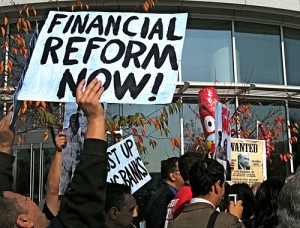 Ezra Klein lists the amendments to the Senate financial reform bill that are up for votes today, and you will be entirely unsurprised to learn that this is the one I’m most interested in:
Ezra Klein lists the amendments to the Senate financial reform bill that are up for votes today, and you will be entirely unsurprised to learn that this is the one I’m most interested in:
Collins amendment to mandate minimum leverage and risk-based capital requirements for insured depository institutions, depository institution holding companies, and nonbank financial companies that the Council identifies for Board of Governors supervision and as subject to prudential standards. (#3879)
Leverage! Even the smallest move in the direction of mandating reasonable limits on leverage is more important than the biggest move in pretty much any other direction. The White House opposes legislative caps on leverage because they’re busily negotiating international standards and don’t want to have their hands tied. I say: tie their hands. It might, to coin a phrase, give them some additional leverage in these negotiations. And if the Basel III talks don’t go well, at least we’ll have some regulations of our own.
(But will banks all flee New York for friendlier climes if we have tough leverage regulations and other countries don’t? This is sort of an all-purpose threat against every serious piece of financial regulation ever proposed, so I wouldn’t pay too much attention to it. And Collins’ amendment isn’t exactly a killer: all it says is that the “appropriate” agencies shall establish minimum capital requirements, and those minimums “shall not be less than the generally applicable risk-based capital requirements….nor quantitatively lower than the generally applicable risk-based capital requirements that were in effect for insured depository institutions as of the date of enactment of this Act.” There’s a lot of leeway there.)
Elsewhere, Edmund Andrews argues that we should pay attention to the fight over federal pre-emption. The question is, should federal laws be a floor, with states allowed to set more stringent requirements if they want? Or should federal laws apply across the board?
To the banks, federal pre-emption is an absolute top priority. They’ll tell you it’s incredibly hard to deal with a patchwork of regulations in 50 states. (Just think of the unintended consequences!) But the real reason is they don’t want to have to lobby in 50 different states when they can focus all their lobbying in Washington. It’s true that some states were even worse than Washington about regulating banks, but one strong state attorney general often provides a template for all the others. Just think about the role of state AG’s in tobacco litigation. That’s what really scares banks.
This time, according to Andrews, it’s mostly centrist Democrats who are fighting to weaken state rules. I’m actually sympathetic in general to the argument for nationwide rules when it comes to interstate commerce like banking, but I think Andrews is right: in the case of banking regulation, states can be the laboratories of democracy just as effectively as they can in other areas, and experimenting with tougher regs is probably a useful exercise. Let’s not cut them off at the knees.














